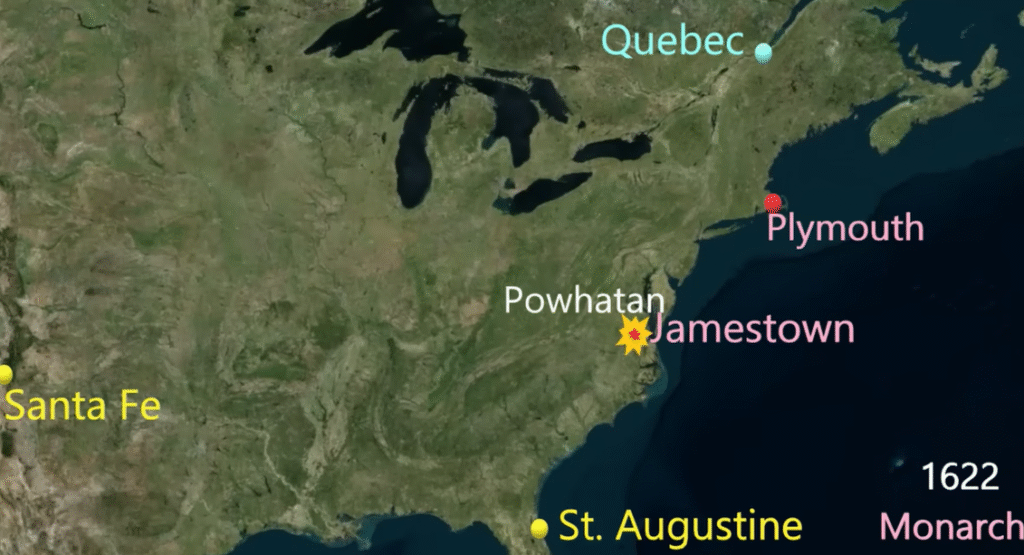The answer is very clear when we ask which colonial settlement was founded for economic reasons: Jamestown, Virginia. The Virginia Company of London founded Jamestown in 1607 with the intention of making money, not as a social experiment or a place of worship. In England, investors wanted to open markets, increase trade, and make money by extracting resources. The settlement resembled contemporary startups in many respects—high-risk, extremely ambitious, and concentrated on generating profits for shareholders.
Gold and other valuable commodities were expected to yield rapid profits for the Virginia Company. But the truth was harsher. In its early years, the colony was nearly destroyed by disease, famine, and strained ties with Indigenous communities. Unexpectedly, John Rolfe’s introduction of tobacco allowed for survival. His crop was extremely successful in bringing economic stability to Jamestown and solidified tobacco as Virginia’s mainstay. The economic underpinnings of Jamestown became abundantly evident after that; cash crops, labor, and land would support expansion.
Utilizing its rich soil and transatlantic trade networks, Virginia became a major economic force. However, the prosperity was based on a system that increasingly used African labor in slavery, establishing a practice that would influence American history for centuries to come. Exports of tobacco to England generated a consistent flow of income, and the colony’s continued existence was no longer in doubt. From its precarious origins, the settlement had significantly improved and was now a flourishing business closely linked to mercantile profit.
Colonial Settlement Information
| Settlement | Established | Founders / Sponsors | Purpose | Outcome |
|---|---|---|---|---|
| Jamestown, Virginia | 1607 | Virginia Company of London | Primarily economic (profit, trade, resources) | Became profitable with tobacco; first permanent English colony in North America |
| Plymouth, Massachusetts | 1620 | Pilgrims (Separatists from England) | Religious freedom | Struggled early but survived; laid foundation for Puritan New England |
| Massachusetts Bay | 1628 | Puritans, Massachusetts Bay Company | Religious community, governance | Became a major center of Puritan culture and self-rule |
| Maryland | 1632 | Cecil Calvert (Lord Baltimore) | Haven for Catholics, also economic | Tobacco-driven economy, strong plantation culture |
| Carolinas | 1663 | Lords Proprietors under royal charter | Economic (cash crops, trade) | Rice, indigo, and enslaved labor fueled prosperity |
| Georgia | 1732 | James Oglethorpe and Trustees | Initially social reform, later economic | Developed plantations after shift to slavery, thriving agriculture |

Plymouth’s purpose is very different from Jamestown’s. With its foundation in communal cooperation and spiritual aspirations, Plymouth was founded in 1620 by Pilgrims escaping religious persecution. Its inhabitants lived by small-scale farming, faith, and group survival. Jamestown’s beginnings, in contrast, were especially inventive due to their emphasis on business. It is very effective to highlight this distinction because it shows how two different models of colonial life—one driven by faith and the other by profit—were produced by economic and religious factors.
Following Virginia, the Southern Colonies built upon the Jamestown model. Maryland’s lucrative tobacco plantations were paired with its Catholic sanctuary. Slave labor was used to grow rice and indigo, which flourished in the Carolinas and became a very dependable source of export fuel. After starting out as a charitable haven, Georgia quickly became another colony that relied on cash crops. The economic aspirations of Jamestown were shared by all of these settlements, despite their differing purposes.
On the other hand, the Northern Colonies established diverse economies that balanced trade, shipbuilding, fishing, and production. Their remarkably diverse industries, not reliance on a single crop, were the source of their resilience. Although they also sought financial gain, Jamestown is clearly the earliest and most pristine example in the main narrative about “which colonial settlement was established for economic reasons.”
Beyond textbooks, Jamestown’s story has resonance. It’s similar to how big projects frequently encounter serious obstacles before succeeding. Similar to how contemporary shareholders seek out rapid gains, investors anticipated immediate wealth. Rather, they lost repeatedly until tobacco made a breakthrough. Understanding how economic determination frequently reshapes societies, even when the initial vision fails, is made easier by the parallels.
Cultural narratives also play a role in this economic story. A literary and cinematic classic, John Rolfe and Pocahontas’ marriage represents the meeting point of trade and diplomacy. Their story, despite its romanticization, captures the larger dynamics of cross-cultural interactions, profit, and survival that shaped Jamestown. It demonstrates how private lives were woven into economic demands in ways that were remarkably successful for colonial survival.
With the establishment of the House of Burgesses in 1619, the colony also instituted representative government, illustrating the interdependence of politics and economics. Both prosperity and governance were influenced by each other. That dynamic, which was remarkably resilient over time, had an impact on the democratic institutions that came to define America.
Regarding the question of whether colonial settlement was founded for economic reasons, Jamestown provides the conclusive answer. It was founded on the desire for profit, it was sustained by a cash crop, and it grew through trade and hard work. The economic model developed there served as a model for other colonies and influenced the course of American development.
Its legacy today feels remarkably similar to the conundrums that multinational corporations face: the need to balance the pursuit of profit with concerns about justice and equity. Because of slavery and the uprooting of Native communities, Jamestown not only produced wealth but also solidified inequality. This dual legacy serves as a reminder that, despite its remarkable ability to create prosperity, economic ambition must always be balanced against the human costs involved.

